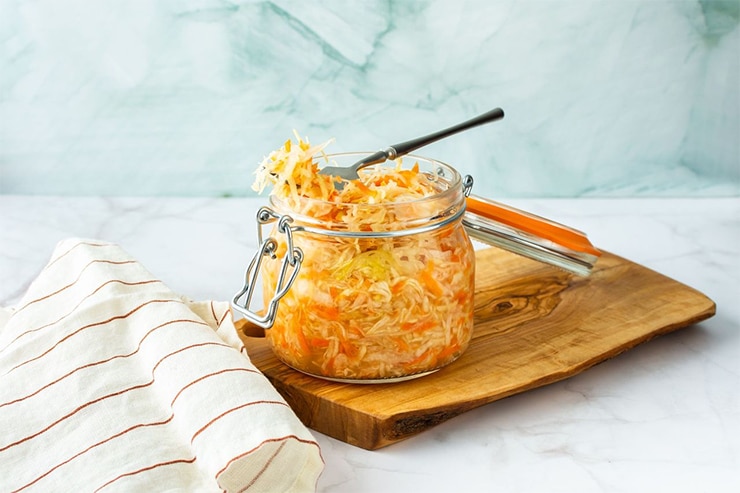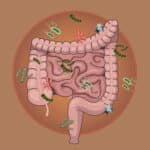How to Make Fermented Carrots

When carrots are fermented, what this really means is that the carrots have been preserved by lactic acid fermentation. This process not only gives the carrots a tangy flavor but also enhances their nutritional value.
Carrots are known to be a rich source of vitamins and minerals, including vitamin A, potassium, and fiber. However, the fermentation process can increase the bioavailability of these nutrients and even create new ones. For example, the lactic acid bacteria that’re responsible for the fermentation process can produce the B vitamins folate and vitamin B12. Both of these vitamins are important for energy production and proper cell function.
In addition to increasing nutrient bioavailability, fermented carrots can also improve the health of your GI tract. The lactic acid bacteria present in fermented foods can help to restore the balance of beneficial bacteria in the gut, which can be disrupted by poor diet, stress, and the use of antibiotics. This can improve digestion and immune function and reduce the risk of inflammatory bowel disease and other gut-related conditions.
Studies have shown that fermented foods, including carrots, can have anti-inflammatory properties. Chronic inflammation is known to be a contributing factor in many diseases, including heart disease, diabetes, and it’s a driver for leaky gut. By reducing inflammation in the body, fermented foods may help to prevent or alleviate the symptoms of these conditions.
Fermented carrots may also have cancer-fighting properties. Carrots are naturally high in antioxidants, which can help to prevent cellular damage and reduce the risk of cancer. The fermentation process can increase the antioxidant activity of the carrots and even produce new compounds with anticancer properties.
One study found high levels of phenolic compounds, which are known to have antioxidant and anticancer properties. The study also found that the fermentation process increased the total phenolic content of the carrots, suggesting that fermented carrots may have even greater health benefits than raw carrots.
Another study found that the lactic acid bacteria present in fermented carrots produced a compound called conjugated linoleic acid (CLA), which’s been shown to have anticancer properties in animal studies. While more research is needed to determine the potential anticancer effects of fermented carrots in humans, these findings are promising. Sounds like it’s time to make some delicious fermented carrots!
Fermented Carrots Recipe

Create a probiotic treat by fermenting carrots!
Use as a condiment in salads, over poultry or as a side dish.
Once you get the hang of this, you’ll find it really easy to make fermented vegetables!
Fermenting time: 3-4 days
Prep time: 20 minutes
Ingredients (pleases choose organic):
- 2.5 pounds of organic carrots, mix of yellow and orange (Approx 12 medium)
- 1.5 tablespoons organic ginger, minced
- 2 tablespoons of sea salt
Equipment:
- Mason jar, wide mouth preferred, with lid
- Wide mouth funnel
- Tongs
- Fermentation weight
Instructions:
**Read notes below before starting your recipe.
- Grab a wide mouth mason jar with a lid.
- Wash and shred carrots. Place shredded carrots, ginger (see notes) and salt in a large bowl.
- Mix well to evenly distribute salt and ginger, then cover with a clean cloth and set aside for 30 minutes.
- Then mix well again.
- Place a funnel into your jar and use tongs to pack the carrot mixture into the jar. Use the tongs to pack the carrots down as you go, so you remove all the air bubbles.
- Pour the remaining liquid from the bowl into the jar, so it is around 95% full.
- Place fermenting weight over the carrots to weigh them down – the goal here is that the carrot mixture is completely submerged.
- Screw the lid on, but don’t tighten completely, so there is still a little air flow.
- Check on your carrots daily. If the carrots are not fully submerged, pack them down more, add a little chlorine free water and screw lid back on.
- Leave in a dark place for three days.
- Taste your carrots – if you like the flavor, remove the fermenting weight and screw lid on fully and place in the refrigerator. If not, allow the carrots to ferment one more day.
**Notes:
- Try not to use your hands, so you don’t introduce bacteria to your mixture.
- Sterilize your jar, funnel, bowl, weight and utensils by submerging in boiling water. Remove with clean tongs (place tips of tongs in the boiling water to sterilize) and place on a clean surface. Use the tongs to place the carrot mixture into the jar.
- Ginger: look for organic minced ginger (I use The Ginger People brand)
- Spoilage isn’t common. This process creates an acidic environment that allow healthy flora, like Lactobacillus, to win out over other bacteria. You might see some color change and this is normal. If any carrots were unsubmerged for a period of time and changed color as a result, simply scrape them off and use the weight a small amount of chlorine free water to bring the liquid level back up. As the carrots ferment, they will release more fluid, so you may simply need to pack them down a little more.
- Di Cagno, R., Surico, R. F., Minervini, G., Rizzello, C. G., & De Angelis, M. (2018). Fermented vegetables: Current achievements and future prospects. Foods, 7(10), 170. https://doi.org/10.3390/foods7100170
- Marco, M. L., Heeney, D., Binda, S., Cifelli, C. J., Cotter, P. D., Foligni, R., Ganzle, M., Kort, R., Pasin, G., Pihlanto, A., Smid, E. J., Hutkins, R. W. (2021). Fermentation in food processing: Benefits, risks, and challenges. Comprehensive Reviews in Food Science and Food Safety, 20(4), 1063-1103. https://doi.org/10.1111/1541-4337.12702
- Selhub, E. M., Logan, A. C., & Bested, A. C. (2014). Fermented foods, microbiota, and mental health: Ancient practice meets nutritional psychiatry. Journal of Physiological Anthropology, 33(1), 2. https://doi.org/10.1186/1880-6805-33-2
- Simopoulos, A. P. (2016). An increase in the Omega-6/Omega-3 fatty acid ratio increases the risk for obesity. Nutrients, 8(3), 128. https://doi.org/10.3390/nu8030128
- Wang, C. Y., Huang, H. W., & Wu, T. H. (2016). The effects of lactic acid bacteria fermentation on phenolic compounds, antioxidant activity, and carotenoids of carrots. Journal of Food Science and Technology, 53(2), 1022-1029. https://doi.org/10.1007/s13197-015-2108-8
Enjoying this content? Sign up for updates... It's FREE!

















